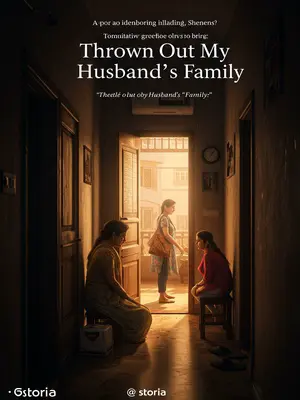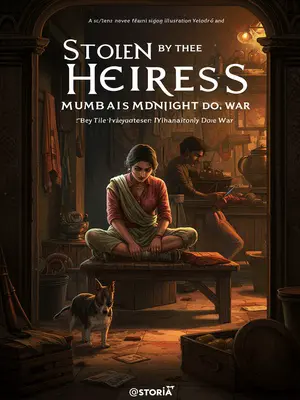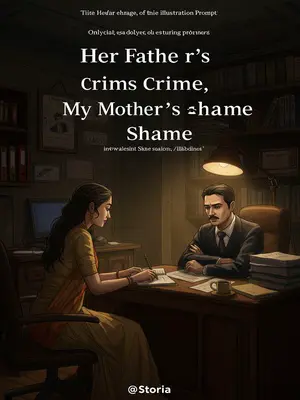Chapter 1: Arrival and First Battles
When he grows up, he’s cold and distant—violent, reckless, the sort of man Mumbai whispers about. He sends his own father to a mental hospital and leaves me, his stepmother, to handle the final rites at the ghat. He torments the good girl who loves him, in every way. Only after she dies does he come to his senses—clutching her ashes, leaping into the sea.
But right now, the Buddhist child is just seven. Still soft around the edges, not yet a mala-stringing maniac. The script handed to me is that of the evil stepmother, and his father truly is unwell.
I pinched Kabir’s chubby cheeks and said, half-joking, half-earnest: “Finished your beads, Kabi? Then go play outside. You must finish these beads—still waiting to give them away, na.”
He looked up, eyes wide and serious. “But we’re the Buddhist child of Mumbai high society. We can’t just laugh all the time. If I tell a joke, you have to hold it in, okay?”
As I teased him, I noticed the warmth and softness of his skin—the kind of chubbiness only a child with hidden sadness carries. My voice, light as I tried to keep it, held a heaviness known only to those who’ve watched life’s unfairness from the sidelines. Outside, crows cawed, an auto rickshaw honked, and the rustle of Gulmohar leaves drifted through the half-open French windows, Mumbai’s familiar chaos bleeding into our bubble.
When I transmigrated here, I’d just married Kabir’s father, Arjun. After the wedding, Arjun left straight for the airport—off on a business trip for three months, he said. He left me and Kabir staring at each other in the silent, too-big drawing room.
Kabir snorted, glanced at me with cool disinterest, then lowered his head, methodically counting the rudraksha beads in his hand.
So young, already carrying the world on his shoulders.
I quickly sorted out the plot in my head. Good news: Kabir is only seven—he hasn’t turned dark yet. Bad news: I’m stuck with the script of a villainous stepmother.
In the original story, the previous host abused Kabir until he developed manic depression, spread rumors he was possessed, then sent him away to an ashram for over a decade. When Kabir returned, she was killed for her heart and liver—her body left at the ghat. This child grew up to be a legalist, barely kept in check by the heroine’s halo.
But now I was here, determined to change fate. My advantage? I looked just like Kabir’s late mother. I’d use that to build a bond with him.
I was about to change out of my wedding lehenga when Kabir suddenly barged in, his voice sharp: “Don’t touch my mum’s cupboard, okay?”
In the original, the previous stepmother had not only touched but destroyed his mother’s sarees, tossed her keepsakes, and hoarded anything valuable. Only the rudraksha mala remained—his mother’s last pure memory. Anyone who touched those beads met a bad end, even the heroine.
I quickly shut the cupboard door. “This lehenga is too heavy. Are there any clothes I can wear, beta? I’ve been standing all day, body aching, feet hurting. Can you help me?” I let my voice soften, like the mothers in TV serials always calling, ‘Beta, come na, help me once.’ The scent of mogra from the wedding garlands still clung to me, as if to remind me I belonged here now.
Kabir’s cheeks turned pink, but he kept up his tough act. “Don’t call me beta. There are clothes in the guest room.” His arms folded, gaze averted, clutching his mala tightly.
“Alright, Kabi. Will you show me the way?”
He turned, still serious. “Don’t call me Kabi.” His steps were unsure, as if unused to being followed down the marble hallways.
“Then what should I call you? We have to live together, I can’t just call you ‘arre’.”
“Call me by my name. My name is Kabir.”
“I see, but... usually only that kind of child gets called by their full name.”
“What kind of child?” Kabir turned, curiosity flickering.
I coughed, hesitating, eyes sliding away. “Nothing. Of course you’re not that kind of child.”
The pause between us stretched, thick as Mumbai’s summer heat. For a moment, even the air seemed to hold its breath. I caught a flash of insecurity on his face before he turned away.
I went into the guest room to change, leaving him outside. Heh. Trying to play games with me? Baccha, you’ll be thinking about this all night. I pictured him lying on his bed, counting beads, replaying our conversation until it stung.
Next morning, Kabir sat at the dining table, face full of unspoken resentment. He wanted to speak but wouldn’t lower himself.
What an awkward child. No wonder he’ll chase his wife to the crematorium in the future.
I smiled and started eating. Kabir’s face darkened. “I said, I don’t eat lauki or green beans.”
Aunty Radha, the cook, didn’t even blink. “Beta, this is what sir said—sabzi, dal, sab kuch milega. No nakhra, okay?” The clang of the pressure cooker whistled from the kitchen, and the scent of jeera hung in the air. She sounded like every Mumbai cook—rules first, feelings later.
Kabir’s face flushed with anger and shame. He slammed his steel katori on the marble floor. “I said, I won’t eat!” The clang echoed, sunlight catching the spilled dal in a golden puddle.
A glint of something cold flickered in Aunty Radha’s eyes before she called, “Ramesh Bhaiya.”
Kabir flinched. Uncle Ramesh, the butler, came over, picked Kabir up, and turned to leave. Kabir struggled, sandals scraping the marble, but his resistance was small and sad.
I jumped up and blocked Uncle Ramesh. “What are you doing?”













